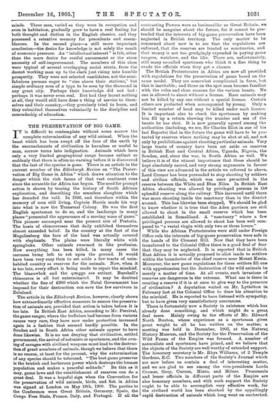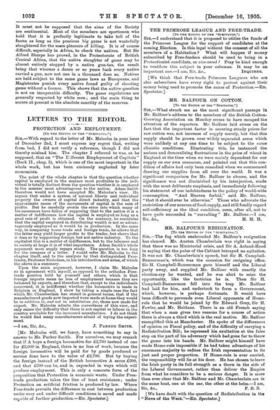THE PRESERVATION OF BIG GAME.
IT is difficult to contemplate without some sorrow the complete extermination of any wild animal. When the beast which has been swept off the face of the earth by the encroachments of civilisation is harmless or useful to man, sorrow turns into indignation. Animals which have only a very limited geographical range become extinct so suddenly that there is often no warning before it is discovered that the last of the species is gone. There is an article in the current number of the Edinburgh Review on "The Preser- vation of Big Game in Africa" which draws attention to the danger which the rich fauna of that vast continent runs since the scramble for Africa has begun. The need for prompt action is shown by tracing the history of South African exploration, and describing the senseless slaughter which has denuded the veld. In 1836, and therefore within the memory of men still living, Captain Harris made his way into what is now the Transvaal Colony. He was the first English sportsman to do so, and the landscape in many places "presented the appearance of a moving mass of game." This pioneer encamped near the present site of Pretoria. The hosts of rhinoceroses that daily exhibited themselves almost exceeded belief. In the country at the foot of the Magaliesberg the face of the land was actually covered with elephants. The plains were literally white with springboks. Other animals swarmed in like profusion. Now everything has been killed, in many cases the carcases being left to rot upon the ground. It would have been very easy then to set aside a few tracts of unin- habited country as reserves for the animals. Now, when it is too late, every effort is being made to repair the mischief. The blaauwbok and the quagga are extinct. Burchell's rhinoceros is all but exterminated. It may be doubted whether the fine of £300 which the Natal Government has imposed for their destruction can save the few survivors in Zululand.
The article in the Edinburgh Review, however, clearly shows how extraordinarily effective measures to ensure the preserva- tion of animals are, provided that action is taken before it is too late. In British East Africa, according to Mr. Percival, the game ranger, where the buffaloes had become from various causes very rare, they have now under protection increased again in a fashion that seemed hardly possible. In the Soudan and in South Africa other animals appear to have done likewise. It is no use denying that civilisation, settled government, the arrival of colonists or sportsmen, and the arm- ing of savages with civilised weapons must lead to the destruc- tion of great numbers of animals, though we believe that there is no reason, at least for the present, why the extermination of any species should be tolerated. "The best game preserver is the brutish and barbarous power which destroys the human population and makes a peaceful solitude." Be this as it may, game laws and the establishment of reserves can do a great deal. It was a hopeful sign when the Convention for the preservation of wild animals, birds, and fish in Africa was signed at London on May 19th, 1900. The parties to the Conference were Great Britain, Germany, Spain, the Congo Free State, France, Italy, and Portugal. If all the contracting Powers were as businesslike as Great Britain, we should be sanguine about the future, for it cannot be pre- tended that the interests of big-game preservation have been neglected in British territory. The only matter to be concerned about now is to see that the regulations are enforced, that the reserves are treated as sanctuaries, and that money is not too grudgingly expended in paying game rangers, watchers, and the like. There are, unfortunately, still many so-called sportsmen who think it a fine thing to evade the officials when they get a chance.
The British Protectorates in Africa are now all provided with regulations for the preservation of game based on the same model. They are somewhat complicated in form, but this is inevitable ; and those on the spot soon become familiar with the rules and close seasons for the various beasts. No one is allowed to shoot without a license. Rare animals may not be killed by any one without a special license. Certain others are protected when accompanied by young. Only a limited number of head may be killed under each license. It is important also to check the sportsman by making him fill up a return showing the number and sex of the beasts he has shot. It is now generally agreed among the authorities (including, we see, Sir Charles Eliot in one of his last Reports) that in the future the game will have to be pro- tected by reserves where .nothing may be shot at all, and not only by prohibitions against shooting particular animals. Very large tracts of country have been set aside as reserves in British East and Central Africa, Uganda, Nigeria, the Soudan, and, since the war, in South Africa as well. We believe it is of the utmost importance that these should be kept absolutely sacred, and very strong arguments in favour of this view are advanced in the article we referred to above. Lord Cromer has been persuaded to stop shooting by soldiers and civilian officials, which was once permitted in the reserve between the White and Blue Niles. In British East Africa shooting was allowed by privileged persons in the splendid reserve along the railway. This increased until there was more shooting inside the sanctuary than in the district around. This has likewise been stopped, We should be glad to know whether it is true that the Aden garrison are still allowed to shoot in the small reserve which has been established in Somaliland. A " sanctuary " where a few privileged persons are allowed to shoot has been well com- pared to "a vestal virgin with only two or three lovers."
While the African Protectorates were still under Foreign Office rule the interests of big-game preservation were safe in the hands of Sir Clement Hill. Now that they have been transferred to the Colonial Office there is a good deal of fear that they may be neglected. It is reported that in British East Africa it is actually proposed to allot lands to settlers within the boundaries of the chief reserve near Mount Kenia. Moreover, the new game regulations for these settlers fill one with apprehension lest the destruction of the wild animals be merely a matter of time. At all events, such invasions of reserves are dangerous in the extreme. What use is there in creating a reserve if it is at once to give way to the pressure of civilisation ? A deputation waited on Mr. Lyttelton in February last at the Colonial Office to draw his attention to the mischief. He is reported to have listened with sympathy, but to have given very unsatisfactory assurances.
There is fortunately now a Society in existence which has already done something, and which might do a great deal more. Mainly owing to the efforts of Mr. Edward North Buxton, whose experience as a sportsman gives great weight to all he has written on the matter, a meeting was held in December, 1903, at the Natural History Museum, and the Society for the Preservation of the Wild Fauna of the Empire was formed. A number of naturalists and sportsmen have joined, and we believe that the objects of the Society are well worthy of extended support. The honorary secretary is Mr. Rhys Williams, of 2 Temple Gardens, E.C. Two numbers of the Society's Journal which are now before us contain a deal of interesting matter, and we are glad to see among the vice-presidents Lords Cromer, Grey, Curzon, Minto, and Milner. Proconsuls and lesser officials in different parts of the Empire are also honorary members, and with such support the Society ought to be able to accomplish very effective work, for the civilised world has been shocked by the appallingly rapid destruction of animals which long went on unchecked. It must not be supposed that the aims of the Society are sentimental. Most of the members are sportsmen who hold that it is perfectly legitimate to take toll of the fauna as long as the precious big game is not wastefully slaughtered for the mere pleasure of killing. It is of course difficult, especially in Africa, to check the natives. But Sir Alfred Sharpe has proved, in the Protectorate of British Central Africa, that the native slaughter of game may be almost entirely stopped by a native gun-tax, the result being that whereas a dozen or so years back every native carried a gun, now not one in a thousand does so. Natives are held subject to the same game laws as Europeans, and Magistrates punish every native found guilty of shooting game without a license. This shows that the native question is not an insuperable difficulty. The game regulations are generally respected by white men ; and the main thing to secure at present is the absolute sanctity of the reserves.



















































 Previous page
Previous page